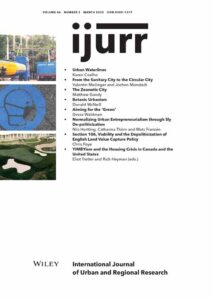In England, when land is granted planning permission its value increases dramatically. Historically, the question of who is entitled to this ‘betterment value’ uplift has been one of the central debates in national politics. However, from the 1980s to 2008, betterment value capture policy became depoliticized. This article seeks to understand how that came about. Focusing on the parliamentary sphere, it proposes that depoliticization took place across three ‘faces’. First, economic interests: rising home-ownership and the broader rentierization of the economy strengthened support for house price inflation and private property rights, thus shrinking the space for political debate around these issues. Second, institutions: under Section 106 and the viability regime, the governance of betterment value capture became fragmented, incorporating an array of unelected ‘experts’, models and rules which worked to reduce the discretion of elected local planning authorities. Third, discourse: from the 1980s onwards, the Labour Party’s discourse around betterment value capture converged with that of the Conservative Party. This convergence was partly driven by ideational changes in the Labour Party and in the discipline of economics. Taken together, these three faces help explain why betterment value capture policy moved away from the realm of contestation and contingency and towards that of fate and necessity.

